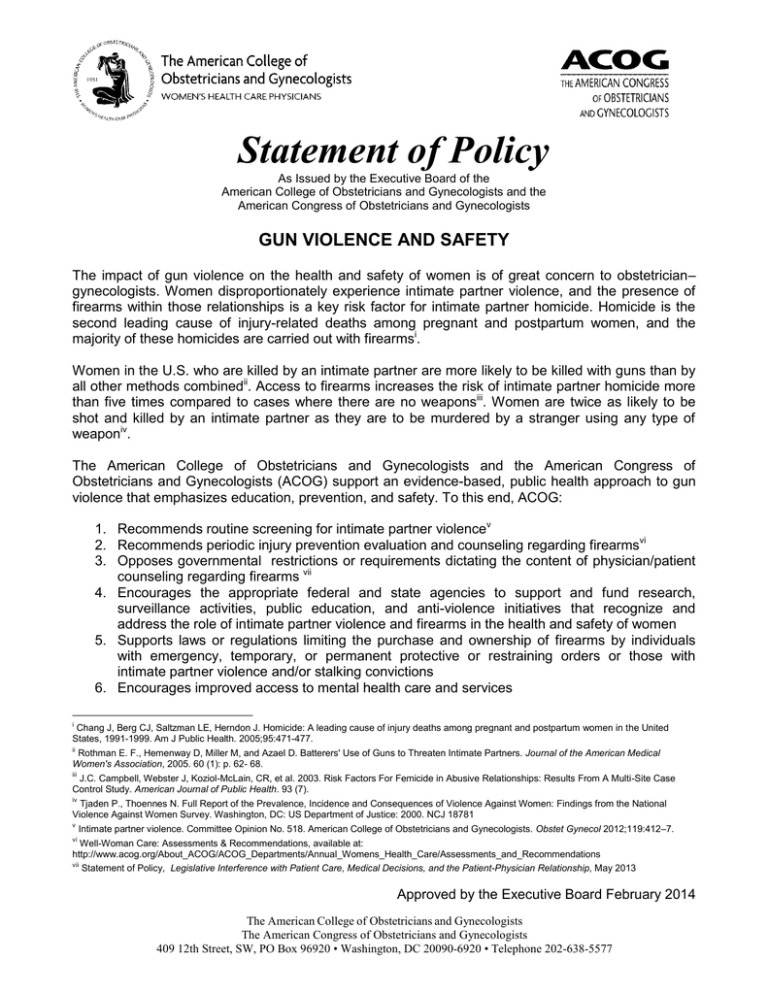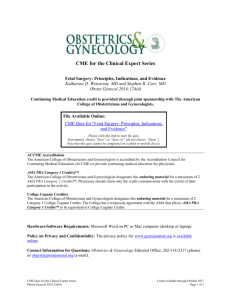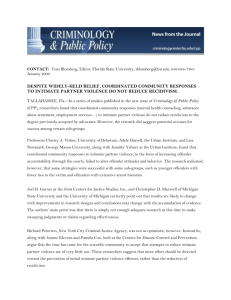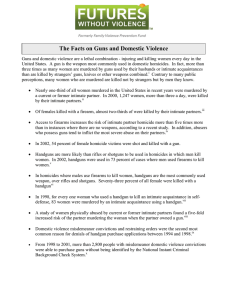Statement of Policy, Gun Violence and Safety
advertisement

Statement of Policy As Issued by the Executive Board of the American College of Obstetricians and Gynecologists and the American Congress of Obstetricians and Gynecologists GUN VIOLENCE AND SAFETY The impact of gun violence on the health and safety of women is of great concern to obstetrician– gynecologists. Women disproportionately experience intimate partner violence, and the presence of firearms within those relationships is a key risk factor for intimate partner homicide. Homicide is the second leading cause of injury-related deaths among pregnant and postpartum women, and the majority of these homicides are carried out with firearmsi. Women in the U.S. who are killed by an intimate partner are more likely to be killed with guns than by all other methods combinedii. Access to firearms increases the risk of intimate partner homicide more than five times compared to cases where there are no weaponsiii. Women are twice as likely to be shot and killed by an intimate partner as they are to be murdered by a stranger using any type of weaponiv. The American College of Obstetricians and Gynecologists and the American Congress of Obstetricians and Gynecologists (ACOG) support an evidence-based, public health approach to gun violence that emphasizes education, prevention, and safety. To this end, ACOG: 1. Recommends routine screening for intimate partner violencev 2. Recommends periodic injury prevention evaluation and counseling regarding firearmsvi 3. Opposes governmental restrictions or requirements dictating the content of physician/patient counseling regarding firearms vii 4. Encourages the appropriate federal and state agencies to support and fund research, surveillance activities, public education, and anti-violence initiatives that recognize and address the role of intimate partner violence and firearms in the health and safety of women 5. Supports laws or regulations limiting the purchase and ownership of firearms by individuals with emergency, temporary, or permanent protective or restraining orders or those with intimate partner violence and/or stalking convictions 6. Encourages improved access to mental health care and services i Chang J, Berg CJ, Saltzman LE, Herndon J. Homicide: A leading cause of injury deaths among pregnant and postpartum women in the United States, 1991-1999. Am J Public Health. 2005;95:471-477. ii Rothman E. F., Hemenway D, Miller M, and Azael D. Batterers' Use of Guns to Threaten Intimate Partners. Journal of the American Medical Women's Association, 2005. 60 (1): p. 62- 68. iii J.C. Campbell, Webster J, Koziol-McLain, CR, et al. 2003. Risk Factors For Femicide in Abusive Relationships: Results From A Multi-Site Case Control Study. American Journal of Public Health. 93 (7). iv Tjaden P., Thoennes N. Full Report of the Prevalence, Incidence and Consequences of Violence Against Women: Findings from the National Violence Against Women Survey. Washington, DC: US Department of Justice: 2000. NCJ 18781 v Intimate partner violence. Committee Opinion No. 518. American College of Obstetricians and Gynecologists. Obstet Gynecol 2012;119:412–7. vi Well-Woman Care: Assessments & Recommendations, available at: http://www.acog.org/About_ACOG/ACOG_Departments/Annual_Womens_Health_Care/Assessments_and_Recommendations vii Statement of Policy, Legislative Interference with Patient Care, Medical Decisions, and the Patient-Physician Relationship, May 2013 Approved by the Executive Board February 2014 The American College of Obstetricians and Gynecologists The American Congress of Obstetricians and Gynecologists 409 12th Street, SW, PO Box 96920 • Washington, DC 20090-6920 • Telephone 202-638-5577



